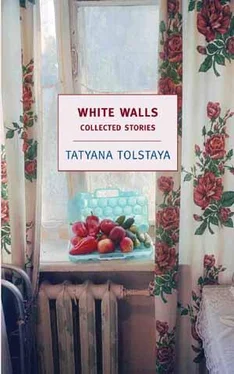Zhenechka traveled to the seamstresses through the black dawn by ice-cold tram; she ran, cold and ruddy, into the thoroughly heated wooden office and immediately looked about for the one she cherished: a rather gloomy, stoop-shouldered history teacher. He would walk toward her without noticing her and pass her by, and she dared not gaze after him. Her face burned, her hands trembled a little as she opened the workbooks, but he—he walked about the same building as she and thought his own thoughts. Such was the love that was her lot.
No one knew, and no one will ever know, what words she silently sent him while he stood by the window of the teachers’ lounge and looked out at the snowy yard, where sparrows swayed like dark berries on branches. She probably yearned to say something honest, serious, and unremarkable, to make a modest request: notice me, love me—but who says that sort of thing out loud? No one knew where he had been before, this man, nor where he went, but he must have come from somewhere. Dark-faced, taciturn—hed been gassed in the first war, people said. He coughed dully in the wooden corridors, clutching his sunken chest in its soldier’s shirt, and he smoked, smoked in the cold vestibule, where clumps of cotton batting stuck out of the insulated doors, where a feeble pink sun shattered against frosty purple stems on the frozen sill. He warmed his hands at the tile stove, smoked another cigarette, and left to lecture the seamstresses on history; the sound of his cough and his quiet, rather strained voice came from behind the tightly closed doors. Such was the man who pierced Zhenechka’s heart, but neither of them said anything important to the other. And then who was Zhenechka to him? Just a good coworker. There was nothing between them except the mugs of tea that she poured for him in the teachers’ lounge after lessons—trembling, her knees weak from her own foolhardiness. Madness, madness… It was no ordinary cup; it was a loving cup, adroitly disguised as a comradely one: Zhenechka poured tea for all the teachers, but she didn’t give everyone so much sugar. A dark blue, chipped mug with a black border—that was all. And he drank it gratefully and nodded: “Good tea, Evgeniya Ivanovna. It’s hot.” And Zhenechka’s love—a homely, barefoot orphan—danced for joy.
That was it, and there was nothing more at all, and soon he disappeared, and there was no one to ask.
Far outside the city, beyond the wasteland of the outskirts, beyond the weedy alder copses, off the big roads, amid the pine forests and glades of fireweed, abandoned, surrounded by overgrown lilac, the dacha quietly ages. The lock is rusting, the porch rots, thistle has strangled the flower beds, and prickly raspberry edges away from the fence and across the garden, timidly at first, then ever more boldly, twining into the nettle to form a burning hedge.
At night the wind rises and flies over the blustery, deserted lake; collecting a misty dust and the hum of uninhabited expanses, it tears an iron sheet from the roof, rumbles it about, and flings it into the garden. The wind-bent grass whistles, wild berries and the seeds of wild plants scatter on the humid night earth, sowing a gloomy harvest of dragon’s teeth. And we thought Zhenechka was immortal.
We didn’t listen to the end of her stories, and now no one will ever know what happened to the mute boy; we threw out unread the books she gave us; we promised to come visit her in her Leningrad apartment but we didn’t mean it; and the older we grew the more excuses we found to avoid her cold, lonely home. And when we finally did come, how she rushed to and fro with joy, how she clutched us—already grown a head taller than she—with small, dry hands, how she flung herself from the table to the stove, where an apple pie was already well under way, how hurriedly she straightened a festive tablecloth on the round table, anchoring it firmly with a vase of autumn roses! And how hastily she smoothed out the high bed’s worn silk coverlet, pale, like the fluid, frayed petal of an enormous rose abandoned by August and possessed by a dusty, indoor spirit, a coverlet so light it couldn’t be thrown over the bed with one broad flap; rumpling in a slow glide, slack and indifferent, it descended unevenly, riding handfuls of stale household air as it fell and shuddering long after it landed, stirred by the thin streams of a warm draft, by the rumble of trucks outside. And, having eaten her pie, we would depart feeling awkward and relieved, and we would relish the autumn air, and laugh at everything, looking all around us eagerly for the arrival of love, which we expected any minute now—long, true love, everlasting and unique—while the love that leaned against the win-dowpane above and watched us go was too simple and mundane for us. But Zhenechka, thank God, didn’t realize that. And she fervently awaited the new summer, awaited her rendezvous with the old dacha, with the new flowers, and with us, her beloved ones.
And summer came.
The era of cooks passed. Fed up, Marfa left, taking away in her trunk the little capital she’d accumulated from milk bottle deposits; the silver fox furs rotted in the storerooms, the factory fences fell apart, and Leningrad gardens turned crimson with wild roses. The school years were coming to an end, the examinations loomed ahead, and energetic Zhenechka prepared for a decisive summer of work. But all this voluntary service— drumming Russian grammar into the heads of ungrateful, sarcastic lazybones day after day; clearing the jungles of dense, stubborn, wily ignorance; planting the cleared terrain with shapely grammatical trees, their spreading branches sibilant with the fuzzy suffixes of Russian participles; trimming away dry knots; grafting flowering branches into place and gathering the fallen fruit—all this toil was apparently not enough for her. The uneasiness of the eternal cultivator drove her into the garden, once as untended and wild as the heads of her pupils. We would urge her to stretch out in the chaise lounge in the sun: what could be better for an old person—just cover your head with burdock leaves and doze till dinnertime. But instead it was we who collapsed in the chaise lounge, languid from sun and adolescence, while Zhenechka tied a kerchief on her head and marched into the overgrowth with shears and a rake. Who had the time to notice that in place of molehills and mountains of stinging nettle, swaying flowers rose in a gentle froth. In her hands flowers seem to soar: ornate pink hydrangeas like bombs ready to burst into red, or else blue ones like a mousse of whisked sky tinged with smoky thunderheads; thick peonies of dark, swooning velvet; and some frizzy, nameless trifle that was splashed all about like a quivering white rain. Only her beloved roses did poorly, no matter how hard she tried. We knew that Zhenechka dreamed of a genuine red rose, pure and deep like the sound of a cello; but either the meager northern warmth held them back, or the earth in our garden rejected the timid roots—the roses grew small, waifish, consumptive.
Zhenechka would come onto the veranda greatly distressed, and casting an alarmed look at us, she’d say, “Worms are eating the roses.” “Give ’em the old one-two,” we answered, bored. “Make an example of them.” “Cut off their quarterly bonus.”
But she was afraid of them—of flower worms, and rain worms, and especially of mushroom worms; it was difficult to slip a basket of mushrooms past her watchful eye. Arrest, inspection, and destruction threatened our booty, so we had to hand the basket straight through the low kitchen window while someone stood watch. Hastily dashing icy well water over the slippery, jumping, liplike brown boletuses stuck with leaves, or the pale, wide russulas that crumbled like shortbread and squeaked in our hands, we would throw them into the noisily boiling pot, using a straining spoon to hold back the mushrooms crawling over the rim and to skim off the turbid foam full of dead, floating worms. At the clunk of Zhenechka’s orthopedic shoe we would work faster, bustling and giggling, and by the time she ceremoniously entered the kitchen, pushing open the door with a royal gesture, the burbling broth already shone with a dark, transparent purity.
Читать дальше












